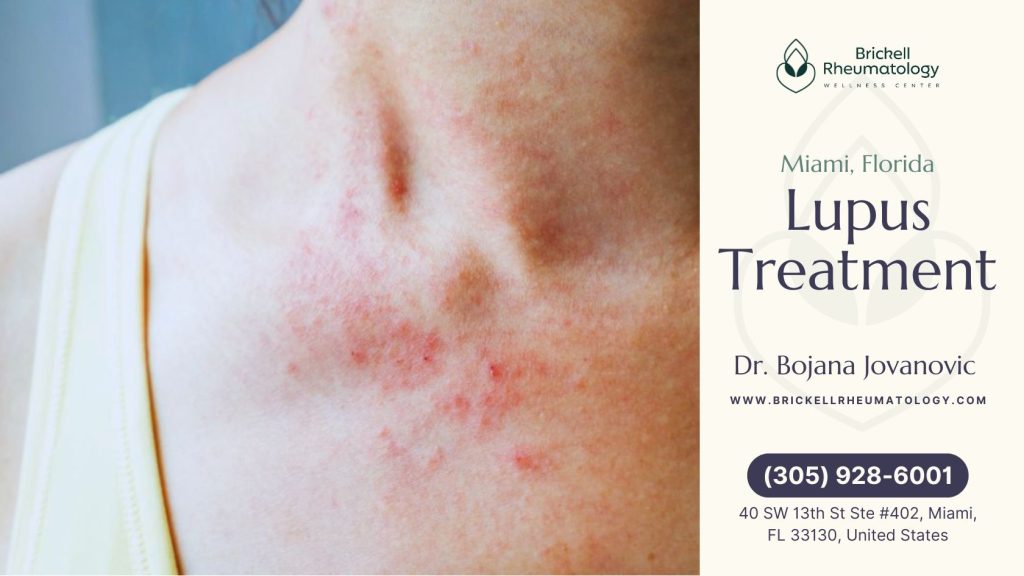Lupus Treatment in Miami, FL
Short on energy, sore joints, and flare-ups that derail your week? Our approach to lupus treatment in Miami focuses on supportive care that addresses symptoms and potential triggers so you can move toward steadier days and a clearer plan.
At Brickell Rheumatology Wellness Center, Dr. Bojana Jovanovic offers a patient-centered approach to lupus care. Your plan may include conventional therapies coordinated with your medical team and supportive strategies aimed at symptom relief, immune balance, nutrition, and lifestyle adjustments. We take time to listen, review your history, and collaborate on steps that fit your goals.
Types of Lupus
Systemic Lupus Erythematosus (SLE)
SLE is the most common and complex form of lupus, affecting the skin, joints, kidneys, and other organs. Early evaluation, continuous monitoring, and individualized care help protect organ function and reduce flares. Treatment often includes medication support along with lifestyle and nutritional strategies to reduce inflammation and stabilize symptoms.
Cutaneous Lupus Erythematosus (CLE)
CLE primarily affects the skin, appearing as rashes or lesions—often triggered by sun exposure. Dermatologic changes can be distressing, especially when they appear in visible areas, which is why we focus on prevention and protective strategies alongside medical care. With the right plan, many patients experience fewer flares and improved skin health.
Drug-Induced Lupus (DIL)
DIL occurs in response to certain medications (e.g., hydralazine, procainamide) and typically improves once the triggering drug is discontinued. Symptoms often resemble systemic lupus, though they tend to resolve with time and proper monitoring.
Neonatal Lupus
Neonatal lupus is rare and occurs in babies born to mothers with specific autoantibodies. Most symptoms (e.g., rash, blood count changes) fade within several months as the antibodies leave the infant’s system. When heart rhythm issues occur, coordinated care with pediatric specialists helps guide long-term well-being.
Lupus Treatment Options

Medications
NSAIDs (e.g., ibuprofen, naproxen) may help with pain and swelling. Monitoring helps reduce GI/kidney risks.
Antimalarials (e.g., hydroxychloroquine) are commonly used to help reduce flares and skin/joint symptoms; regular eye exams are recommended.
Corticosteroids can calm inflammation quickly. We aim for the lowest effective dose with gradual tapering when appropriate.
Immunosuppressants & Biologics (e.g., azathioprine, mycophenolate, belimumab) may be considered for organ involvement or higher disease activity, with regular follow-up for safety.
Lifestyle & Immune Support
Nutrition: Emphasize whole foods, vegetables, lean proteins, and omega-3s; limit highly processed, high-sodium, and high-sugar items.
Movement: Low-impact activities (walking, swimming, yoga) can support mobility and energy; pace activity to avoid overexertion.
Rest & Stress Care: Consistent sleep habits, mindfulness, and relaxation practices can help with fatigue and coping.
Complementary Options: Some patients explore acupuncture, massage, or mind-body practices alongside medical care. Discuss with your clinician to tailor safely.
Medical guidance is individualized. We collaborate with your other clinicians to align medications and supportive care.
Benefits of a Structured Lupus Care Plan
A thoughtful, tailored treatment strategy helps reduce inflammation, pain, and fatigue, allowing patients to move with greater ease and confidence. Consistent monitoring and supportive care may help protect organs and reduce long-term complications. Over time, individuals often experience better symptom stability and greater ability to participate in daily activities they enjoy.
What to Look for in a Lupus Practitioner
Autoimmune Knowledge & Functional Perspective: Familiar with lupus and immune pathways; considers potential triggers (inflammation, stress, diet, gut health) and integrates supportive strategies alongside physician-directed care.
Individualized, Patient-Centered Plans: Listens, reviews history and labs, identifies triggers, and tailors a plan that may include medications coordinated with your doctor plus nutrition, sleep, movement, and stress support.
Long-Term Focus: Aims to reduce flares and protect organ health over time through sustainable lifestyle changes, monitoring, and step-by-step adjustments.
Why Patients Trust Brickell Rheumatology Wellness Center
Dr. Bojana Jovanovic dedicates time to truly understand each patient’s needs, creating individualized wellness programs that include medical guidance, nutritional insight, and lifestyle strategies. As a solo practitioner, she offers continuity of care and consistent support, allowing patients to build a meaningful relationship with their physician. Her calm approach and focus on long-term well-being help patients feel confident in their treatment path.
Frequently Asked Questions
Can Lupus Be Cured?
There is currently no cure for lupus, but effective lupus treatment can help manage symptoms and improve the quality of life. A functional medicine approach aims to reduce inflammation, strengthen the immune system, and prevent flare-ups through individualized care. Dr. Bojana Jovanovic focuses on long-term health strategies that go beyond conventional medicine, empowering patients to control their symptoms naturally and maintain stability with fewer medications over time.
How Does Functional Medicine Help with Lupus Treatment?
Functional medicine takes a holistic approach to lupus treatment by identifying underlying triggers such as stress, diet, gut health, and inflammation. Instead of just treating symptoms with medication, Dr. Bojana Jovanovic designs customized treatment plans that focus on improving overall well-being. It includes personalized nutrition, targeted supplements, stress management, and lifestyle adjustments that help patients experience fewer flares and improved energy levels.
What Lifestyle Changes Can Help Manage Lupus?
Lifestyle changes like a nutrient-rich, anti-inflammatory diet, staying active with regular exercise, getting enough rest, and practicing stress management techniques like meditation and deep breathing can help manage lupus. Avoiding triggers such as excessive sun exposure and processed foods also contributes to better health. Dr. Bojana Jovanovic offers personalized lifestyle guidance to address each patient’s unique health needs, supporting long-term wellness.
Do You Accept Insurance?
Our practice is private-pay, and we do not bill insurance carriers directly. Payment is collected at the time services are provided. This structure helps us dedicate appropriate time to your care without insurance-driven constraints. For standard rheumatology visits, we issue superbills that you can submit to your insurance plan for possible reimbursement; reimbursement depends on your benefits and is not guaranteed. Functional medicine visits are typically not covered by insurance.
Why Should I Pay Out of Pocket When I Have Insurance?
In many insurance-based practices, profitability depends on seeing 4–6 patients per hour, which can mean limited time per visit. Our private-pay structure allows longer visits (60+ minutes) and more complete planning—plus rapid access (7–14 days) compared with common 3–6 month waits.
Comprehensive Lupus Treatment

Living with lupus can feel unpredictable, but you don’t have to navigate it alone. A personalized plan, thoughtful guidance, and consistent follow-up can help you better understand your triggers, manage flare-ups, and feel more in control of your health. At Brickell Rheumatology Wellness Center, we take time to listen, evaluate, and build a tailored care approach that aligns with your lifestyle and long-term wellness goals.
If you’re ready to start a more supportive lupus journey, we invite you to schedule a consultation and discuss your symptoms and options. Contact us to book your visit and begin personalized, compassionate care focused on your well-being.
Consultation Now!
Care Near You
Get rheumatology care close to home:
Brickell, Miami
Coconut Grove
Miami Beach
Key Biscayne
Coral Gables
- 40 SW 13th St Ste #402, Miami, FL 33130, United States
- (305) 928-6001
- info@brickellrheumatology.com
- Mon - Fri: 9:00am - 3:00pm
- Sat - Sun: Closed
